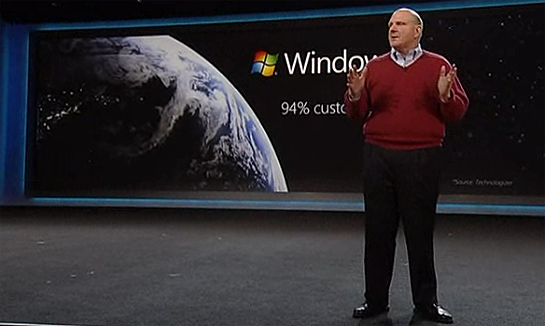 Here’s Europe’s Windows browser ballot.
Here’s Europe’s Windows browser ballot.
Sprint WiMax phone: this summer.
School district denies spying, apologizes.
Grand unified theory of n00bs.
Google’s shopping app for Android.
_______________________
Like 5Words? Subscribe via RSS.
 Here’s Europe’s Windows browser ballot.
Here’s Europe’s Windows browser ballot.
Sprint WiMax phone: this summer.
School district denies spying, apologizes.
Grand unified theory of n00bs.
Google’s shopping app for Android.
_______________________
Like 5Words? Subscribe via RSS.
As Computerworld’s Gregg Keizer has reported, a U.S. District Judge has eliminated the possibility that Microsoft might be liable for hundreds of millions of dollars of damages in class-action suits over its Windows Genuine Advantage copy protection and the method by which it was pushed onto XP machines back in 2006. I’m neither a lawyer nor a instinctive fan of class-action cases, so I’m okay with the news. (But I will say that there was a lengthy period during which WGA and Microsoft’s implementation thereof was an unreliable, vaguely insulting instrument that Microsoft willingly used against paying customers. The current version both works better and involves fewer instances in which people who pay for their software are forced to jump through hoops.)
Web data company Net Applications has released its market share numbers for January. ZDNet’s Adrian Kingsley-Hughes notes that it shows Google’s Chrome with 5.2% of the browser market, and that Chrome appears to be stealing users from Firefox.
Technologizer’s Web stats are, of course, representative only of the Technologizer community–and this site is small enough that fluctuation is normal. (For instance, the percentage of visitors who use Macs varies a lot from month to month, which can skew browser data one way or the other.) But for what it’s worth, the last few months of usage data shows Chrome growing almost continuously, and Firefox jumping around in no clear pattern:
Chrome:
September: 9.05%
October: 8.93%
November: 9.69%
December: 12.65%
January: 14.03%
Firefox:
September: 45.79%
October: 41.35%
November. 42.09%
December: 45.46%
January: 41.43%
Net Applications’ January data also has ten percent of Web users on Windows 7. With Technologizer visitors, it’s sixteen percent–making Windows 7 the second-most used version of any operating system, after Windows XP, which 38 percent of you are still using…
Last Wednesday at his CES keynote, Steve Ballmer showed off three examples of what he called “Slate PCs,” from Pegatron, Archos, and HP. He said they were “perfect–perfect–for reading, for surfing the Web, and for taking entertainment on the go.”


At Steve Ballmer’s Wednesday night CES keynote, he quotes our Windows 7 satisfaction survey as evidence of Windows 7’s strong start. (He merely called it “a recent survey,” but note the attribution in tiny type at the lower right-hand corner…)

Sometimes Microsoft’s biggest competitor is itself. Huge numbers of businesses are still using Windows XP, and Microsoft is acting aggressively to migrate them to Windows 7 by extending a promotion that offers Windows 7 and Office 2007 for half price.
Windows Vista is by many accounts a better operating system than XP, but nearly 90 percent of businesses bypassed the upgrade, and opted to stick with Windows XP, because it was “good enough” for them. Office XP presents Microsoft with a similar problem.
 Microsoft has been offering family packs of Windows 7 to customers for a discounted price–while supplies last. It would behoove it to make the family packs a permanent offering.
Microsoft has been offering family packs of Windows 7 to customers for a discounted price–while supplies last. It would behoove it to make the family packs a permanent offering.
CNET’s Ina Fried is reporting that the packs have nearly sold out. The packs sell for $149.99, which is a bargain considering that three stand-alone copies of 7 Home Premium list for $359.97.
There are two good reasons why Microsoft should make the family packs permanent: Its Windows licensing revenue is suffering, and Apple has long offered them for OS X. (A Snow Leopard 5-pack sells for $49.99.)
While Windows 7 has boosted Microsoft’s license revenues, netbooks have begun to chip away at the Windows cash cow. Windows 7 has proven popular with early adopters, and anything that Microsoft could do to get more customers to upgrade is a good thing.
 Seven ways Windows 7 disappoints.
Seven ways Windows 7 disappoints.
Google’s Schmidt on news’s future.
Google Friend Connect integrates Twitter.
IDC’s tech predictions for 2010.
Friendster–it’s still around?–redesigns.
Fujitsu’s tiny Windows 7 machine.
Like 5Words? Subscribe via RSS.

So to riff on Ronald Reagan’s famous question from his 1980 debate with Jimmy Carter, Are Windows users better off today than they were a few weeks ago, back in the Vista era? We decided to ask the Technologizer community, a group of tech enthusiasts with a high propensity to acquire new operating systems quickly and push them to their limits. Starting on November 16th, we surveyed our readers (and Twitter followers) about their experiences with Windows 7. Our goal: to do a reality check on the mostly favorable initial reviews of the new OS (as well as our own survey of largely enthusiastic Windows 7 beta testers back in March).
The 550+ Windows 7 early adopters who took our survey mostly echo the positive response that the upgrade has received from professional reviewers, pundits, and users of pre-release editions. A sizable majority say they’re extremely satisfied with the OS and rate it as a clear improvement on both the beloved Windows XP and the widely-panned Windows Vista. Crippling installation problems–the bane of every upgrader’s existence, and always a legitimate reason to postpone switching OSes–were rare.
![]() What’s the most wrongheaded conclusion anyone ever came to concerning computers? I covered three of the most legendary ones–“There is no reason for any individual to have a computer in his home,” “640K should be enough for anybody,” and “I think there is a worldwide market for maybe five computers” in The 25 Most Notable Quotes in Tech History. But there’s no evidence that IBM’s Thomas J. Watson said the first one, Bill Gates staunchly denies saying the second one, and DEC’s Ken Olsen and his defenders contend that the last one is him being taken out of context.
What’s the most wrongheaded conclusion anyone ever came to concerning computers? I covered three of the most legendary ones–“There is no reason for any individual to have a computer in his home,” “640K should be enough for anybody,” and “I think there is a worldwide market for maybe five computers” in The 25 Most Notable Quotes in Tech History. But there’s no evidence that IBM’s Thomas J. Watson said the first one, Bill Gates staunchly denies saying the second one, and DEC’s Ken Olsen and his defenders contend that the last one is him being taken out of context.
But here are a couple of seriously silly statements that can’t be disowned–because they appeared in columns in the New York Times in the mid-1980s. Both are by the same guy, Erik Sandberg-Diment (who certainly wasn’t always obtuse–he was visionary enough to found ROM, one of the best early magazines about personal computers). Between them, they add up to one of the least accurate takes on the future of computing that I’ve ever read.
